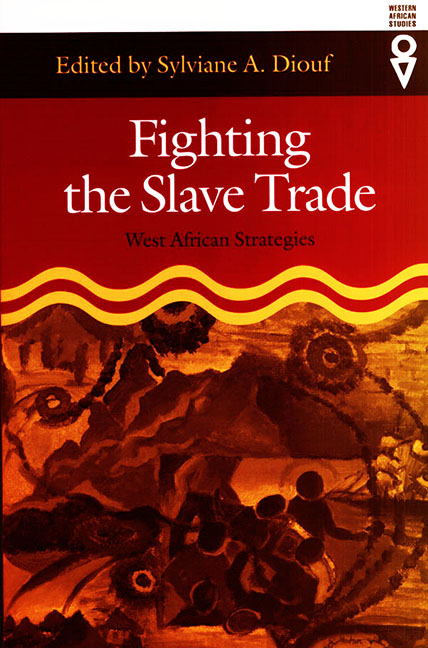Book contents
- Frontmatter
- Contents
- Preface
- Introduction
- PART 1 DEFENSIVE STRATEGIES
- PART 2 PROTECTIVE STRATEGIES
- PART 3 OFFENSIVE STRATEGIES
- 8 Igboland, Slavery, and the Drums of War and Heroism
- 9 “A Devotion to the Idea of Liberty at Any Price”: Rebellion and Antislavery in the Upper Guinea Coast in the Eighteenth and Nineteenth Centuries
- 10 Strategies of the Decentralized: Defending Communities from Slave Raiders in Coastal Guinea-Bissau, 1450–1815
- 11 The Struggle against the Transatlantic Slave Trade: The Role of the State
- 12 Shipboard Revolts, African Authority, and the Transatlantic Slave Trade
- Epilogue: Memory as Resistance: Identity and the Contested History of Slavery in Southeastern Nigeria, an Oral History Project
- Contributors
- Index
12 - Shipboard Revolts, African Authority, and the Transatlantic Slave Trade
from PART 3 - OFFENSIVE STRATEGIES
Published online by Cambridge University Press: 30 August 2017
- Frontmatter
- Contents
- Preface
- Introduction
- PART 1 DEFENSIVE STRATEGIES
- PART 2 PROTECTIVE STRATEGIES
- PART 3 OFFENSIVE STRATEGIES
- 8 Igboland, Slavery, and the Drums of War and Heroism
- 9 “A Devotion to the Idea of Liberty at Any Price”: Rebellion and Antislavery in the Upper Guinea Coast in the Eighteenth and Nineteenth Centuries
- 10 Strategies of the Decentralized: Defending Communities from Slave Raiders in Coastal Guinea-Bissau, 1450–1815
- 11 The Struggle against the Transatlantic Slave Trade: The Role of the State
- 12 Shipboard Revolts, African Authority, and the Transatlantic Slave Trade
- Epilogue: Memory as Resistance: Identity and the Contested History of Slavery in Southeastern Nigeria, an Oral History Project
- Contributors
- Index
Summary
VIOLENT AND NONVIOLENT RESISTANCE by Africans against their enslavement by Europeans has during the last half century been a constant theme in the literature on transatlantic slavery. That literature has helped to put to rest, in the words of one eminent historian, “the myth of slave docility and quiescence” (Genovese 1979, xxiii). It has also been overwhelmingly concerned with slave resistance in the Americas, even in those cases when it is claimed that plantation-based revolts were but one element in a spectrum of resistance that transcended Africa, the middle passage, and the Americas (Craton 1982, 14, 27–28). A few studies of slave resistance in Africa and in the middle passage have, nevertheless, appeared. This chapter further redresses the imbalance in the literature by examining patterns of slave revolts onboard ships at the African coast and in the Atlantic crossing between about 1690 and 1810. Using new quantitative data, it also attempts to uncover explanations of these revolts and to assess their impact on the level of the slave trade as well as its structure. The analysis suggests that rebelliousness by slaves onboard ship and the resulting efforts by European carriers of slaves to curb such behavior reduced shipments below what they would have been in the absence of resistance. It also exposes, however, major variations in the incidence of revolts through time and, equally important, by coastal origin. These cannot be explained by reference to failure of European management regimes onboard slave ships but seem instead to be rooted in differences within the political economy of the various African slave supply regions. Overall, therefore, it appears that patterns of shipboard revolt shed important light on the impact of Africa and Africans on the organization and scale of the Atlantic slave trade as well as on the relationship of the trade in enslaved Africans to the development of Atlantic history.
Whether as organizers or as victims of the transatlantic traffic in slaves, Africans had a major influence on the course of Atlantic history between 1500 and 1850. African merchants retained control over the trade in slaves within Africa and thus helped to determine the magnitude and coastal distribution of shipments from the African coast.
- Type
- Chapter
- Information
- Fighting the Slave TradeWest African Strategies, pp. 199 - 218Publisher: Boydell & BrewerPrint publication year: 2004



